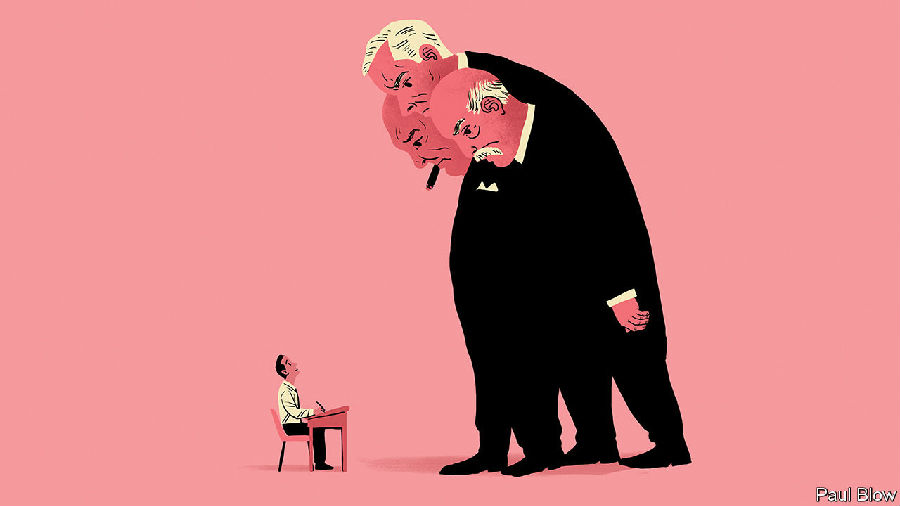Business leaders often have a poor opinion of politicians, preferring to find their heroes elsewhere—in other boardrooms or on the coaching field.
商業領導人通常對政治家的評價很低,他們寧愿在別處—在其他會議室里或是在培訓領域—尋找自己的英雄。
But running a country is an even greater test of leadership and character than running a corporation.
但是相比開公司,領導一個國家是對領導能力和性格的一場更大的考驗。
Those who have passed through the fire surely have something to teach modern-day managers.
那些經歷過真金白銀考驗的領導人當然可以傳授一些經驗給現代的這些管理者。
Take three of the most feted national leaders: Otto von Bismarck, Franklin Roosevelt and Winston Churchill.
以最受人們愛戴的三位國家領導人為例:奧托·馮·俾斯麥、富蘭克林·羅斯福以及溫斯頓·邱吉爾
Many will object both to what they achieved and to the violence they used. But their successes and failures hold lessons for CEOs.
很多人會對他們的成就和他們所使用的暴力持反對意見,但是CEO們需要從他們的成功和失敗中吸取教訓。
Bismarck was an old-school Prussian aristocrat. But he proved remarkably flexible and imaginative during nearly three decades in office.
俾斯麥是一位保守派的普魯士貴族。但事實證明在他執政的近30年中,他是一位處事靈活且富有創造力的領導人。
As a manager, he had a clear goal—to unite Germany under his king (who became Kaiser Wilhelm I in 1871).
作為管理者,他有著一個清晰的目標—在國王的統治下,統一德國(該位國王于1871年成為了德皇威廉一世)。
This required him to overcome the suspicions of other German states, which he did by uniting them against a series of enemies,
實現這個目標需要打消其他德邦聯國家的疑慮,而他做到了,他將聯邦統一起來共同對抗
from Denmark through Austria to France—a merger strategy that allowed Germany to compete on equal footing.
那些從丹麥越過奧地利來到法國的敵人—這樣一個合并的策略讓德國得以平等競爭。
Bismarck also proved flexible when it came to domestic policy.
在談及國內政策時,俾斯麥還是一個很靈活的人。

Though no social reformer, he worried about the danger of working-class support for socialism.
盡管沒有社會改革家,但他還是擔心工人階級會支持社會主義。
So he pushed through a series of welfare measures in the 1880s, including old-age pensions and health insurance.
因此在十九世紀八十年代,他促成了一系列福利措施,包括退休金和健康保險。
He understood the benefits of social responsibility long before CSR departments became a thing.
早在人們意識到社會責任部門的重要性前,他就明白了社會責任的益處。
Like many corporate empire-builders, however, he overreached—in his case by annexing Alsace-Lorraine from France.
和很多企業帝國建造者一樣,只不過他超越了他們—他從法國要來了附屬地阿爾薩斯-洛林。
But his less capable successors were less disciplined still; it was they who led Germany down the path to disaster.
但是他的繼任者們能力弱且沒紀律性,正是他們帶領著德國走向災難。
Where Bismarck built a successful conglomerate, Roosevelt proved to be a consummate turnaround artist.
俾斯麥建立起了一個成功的集團,而羅斯福則是一名爐火純青的扭轉危難的藝術家。
Like the Prussian, FDR showed plenty of flexibility. Although he campaigned for office on the promise of a balanced budget,
和這位普魯士人一樣,富蘭克林·羅斯福處事也非常靈活。雖然,他在競選時承諾要平衡預算,
he adapted when circumstances required it to become the first Keynesian leader.
但當形勢要求他成為首位凱恩斯主義領導人時,他也很快適應了。
Economists will probably spend the rest of history debating the merits of his various policy measures.
歷史學家可能將在剩下的歷史中爭論羅斯福各種政治措施的優點。
But like an executive who rescues a failing company, he showed the power of leaders to change the mood,
但是就像一位拯救破產公司的管理者一樣,他展現出了領導者轉變形勢的能力,
notably with his inaugural declaration that "the only thing we have to fear is fear itself."
尤其是他在就職宣言中所說的“我們唯一需要恐懼的就是恐懼本身。”
譯文由可可原創,僅供學習交流使用,未經許可請勿轉載。












